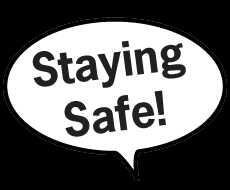How to Open Up While Staying Safe

When you've had your heart broken in a relationship, it can be hard to open up to love again and depend your heart to someone else.
So also, when your accomplice harms you, it can hard to open up and bring trust once again into your relationship. It's difficult to give your heart back to somebody who has demonstrated pernicious.
However, you need to love, you need to trust, you need to open up. Thus you do. Laughing in the face of any potential risk you open up your heart once more, trusting you won't get injured.
Still you wind up getting injured over and over and once more.
This is a situation a large number of us confront, regardless of whether we are single or in a relationship. How would we open up to love and trust someone else while remaining sheltered and shielded from hurt? I have made the accompanying strides for you to do only that.
10 stages to opening up while remaining safe:

- Accept that any individual near you will inevitably hurt you, and keep on hurting you occasionally.
Have you at any point harmed your loved ones? Is it safe to say that it was deliberate, noxious? Is it safe to say that you were sad a while later? Did you experience difficulty conceding your regret?
When others hurt you, understand they are much the same as you. They have likely harmed you inadvertently, and are contrite and sorry a short time later.
- Try not to expect that knowing somebody well or being infatuated will counteract hurt. Despite conditions, time or guarantees, step #1 still remains constant.
Becoming more acquainted with somebody well may keep you from winding up with an accomplice will's identity only hurt and despair. In any case, regardless it won't keep you from getting injured in the end.
- When he or she hurts you, expect it isn't close to home, isn't coordinated at you and isn't about you.
At the point when your accomplice or potential accomplice accomplishes something that influences your heart to throb, recollect a period you incurred hurt on another.
You didn't do it purposefully, malevolently. It's simply that you were helped to remember something in your past. You were anxious. You couldn't encourage yourself, and so on.
The same is likely valid for your accomplice, who was helped to remember something in his/her past, was apprehensive, couldn't encourage him/her self, and so on.
- Figure out how to define limits.
To discover what your limits are, put forth the accompanying inquiries:
*What don't I need in my life, in my connections?
*What kind of conduct harms me?
*How would individuals need to act around me with the goal for me to flourish?
Make a rundown of your answers. Make your limits sufficiently huge with the goal that you feel extremely protected. Begin to instruct individuals about them.
- When you've been harmed, figure out how to quickly deal with yourself by expelling yourself from the circumstance and mitigating your feelings.
For instance, if your accomplice raises his or her voice when disturbed and this damages, figure out how to state "stop" and "I won't discuss this when you raise your voice at me". At that point, accomplish something that influences you to rest easy. It might wash up, or a walk, or viewing a motion picture.
How about we take another illustration. Suppose you are single and sitting tight for a call from a potential accomplice. Suppose you have been sitting tight for a call for a considerable length of time. Expel yourself from the circumstance by completion the hold up - quit sitting tight for the call. Truth be told, disregard the telephone and let the voice-mail lift it up. Presently accomplish something that improves you feel. Treat yourself, support, engage, and so forth.
- Understand that the way to stating safe isn't in confiding in the other individual however in confiding in yourself.
You can never ensure that someone else won't hurt you. Actually, you can be guaranteed that the vast majority - particularly those near you- - will hurt you once in a while. In any case, this does not mean you can never open your heart inspired by a paranoid fear of being harmed.
You can figure out how to confide in yourself to deal with you in a harmful circumstance by expelling yourself from the circumstance and relieving your feelings.
- Turn into the sort of individual who can be trusted to deal with her/him self first and dependably.
When you can confide in yourself to dependably deal with you to start with, your heart will end up safe and you will don't hesitate to shape or revive a relationship. It's that vital.
Dealing with you can be anything from terminating a battle the moment it starts to quickly voicing a worry to influencing a demand to get what you to need and need. It implies you generally consider yourself and your needs first.
- Figure out how to convey successfully and capably, yet delicately.
You need to attempt and stop the frightful conduct, yet do as such that the individual does not detest you.
For instance, suppose again that your accomplice raises his or her voice at you in outrage, which you don't care for.
You might need to stop the conduct by serenely saying something like, "Kindly don't address me with a raised voice. I can't hear you when you raise your voice and I need to hear you. Would we be able to talk serenely now or would it be advisable for us to have this discussion later?"
Our second case might be more proper for singles. Suppose you are as yet sitting tight for that telephone call. The individual at last calls a few days after the fact. On the off chance that you impart about this, you may state, "I am happy you called. It has been a while since we last talked and I was beginning to free intrigue."
There is no assault, no allegation, yet everything that should be said to have an effect is said with effortlessness and heart.
- Figure out how to confide in your feelings about yourself, your activities and your qualities as more essential than the conclusions of others.
Some of the time seeing someone, harmful things can be said without giving it much thought. In some cases these things don't should be said- - it is clear when your accomplice considers seriously you.
Put stock in yourself and value yourself enough to have the capacity to expel the pernicious words and the dubious sentiment of being judged as superfluous.
- Realize when it's proper to pardon and when it's best to end the relationship.
Any accomplice will hurt you infrequently. The inquiry is how much and how frequently. An infrequent hurt or irritation can be pardoned or managed for the advantage of the relationship. Working through the hurt can influence you to become together.
Then again, in the event that you end up being harmed from the beginning of the relationship and it never stops, you might need to reevaluate your selection of accomplices.
The best news is that when you can deal with you - first and dependably - you will draw in accomplices who will have a tendency to do less harming and considerably more adoring.
Source
There is reasonable evidence that this article has been spun, rewritten, or reworded. Repeatedly posting such content is considered spam.
Spam is discouraged by the community, and may result in action from the cheetah bot.
More information and tips on sharing content.
If you believe this comment is in error, please contact us in #disputes on Discord
Interesting insights! The question of when to be vulnerable and when to put up walls is a very tough one. I think vulnerability is a very valuable and beautiful thing, but there are unfortunately many people out there who either take advantage of such vulnerabilities or still cause harm through a lack of mindfulness or their own wall-building.
Especially when chronic depression or anxiety are involved it becomes much more complex because there can be percieved harm where no harm is done. There can also be the ignoring of harm or writing it off as a fabricated perception. For someone with isolative tendencies it can be especially difficult to handle the idea that the relationship may need to come to an end; once that support link is gone, there may be no one left to turn to (or could be percieved as such even if it's not an accurate assessment).
All in all I stand by my belief that open, honest, and respectful communication is the most important peliece of the puzzle. Without that communication there's no platform to build real trust or even a real friendship. That being said, it doesn't always have to be immediate. Sometimes self care requires some space to breathe.
Thanks for the thoughtful post :)
@resteemator is a new bot casting votes for its followers. Follow @resteemator and vote this comment to increase your chance to be voted in the future!